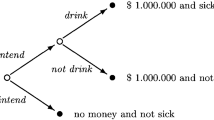Abstract
This comment on Michael Bratman's ‘Planning and the Stability of Intention’ focuses on sources of the rational stability of intentions which are not related to the presence of reflectively overrideable non-deliberative habits of (non)reconsideration. It is true that intentions have a rational resistance to reconsideration, but this stability can be understood as a by-product of the scheduling of cognitive tasks. This scheduling effect is intrinsic to all actual systems, that is, systems whose reasoning is not instantaneous or otherwise costless. Additionally, rules governing practical reasoning, including rules governing reasoning with intentions, will not uniformly be subject to overrides resulting from reflective operations. Hence there is no basis for distinguishing human reasoners from artificial reasoners by reference to an alleged human capacity to reflectivity evaluate its own reasoning operations.
Similar content being viewed by others
References
Bratman, M. E. (1987), Intentions, Plans, and Practical Reason, Cambridge, MA: Harvard University Press.
Pollock, J. (1990), How to Build a Person, Cambridge, MA: MIT press; and ‘A Theory of Defeasible Reasoning’, International Journal of Intelligent Systems, forthcoming.
Author information
Authors and Affiliations
Rights and permissions
About this article
Cite this article
Smith, G. Strategies, scheduling effects, and the stability of intentions. Mind Mach 2, 17–26 (1992). https://doi.org/10.1007/BF00261287
Issue Date:
DOI: https://doi.org/10.1007/BF00261287



